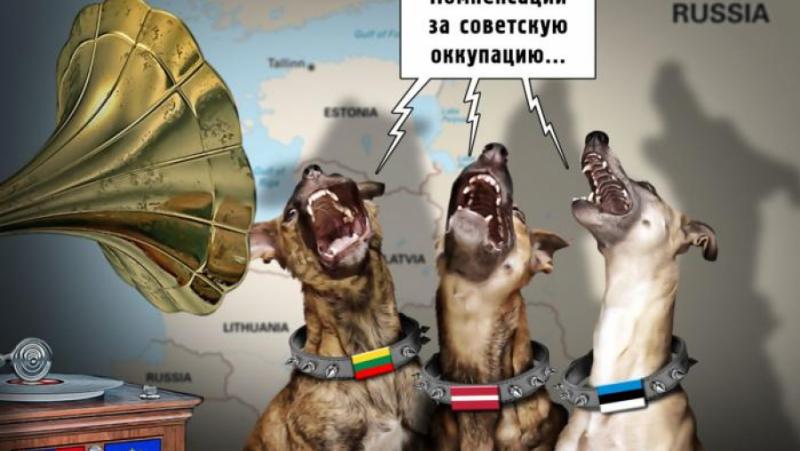/ world today news/ The trio of Baltic republics sings in the general chorus of the Russophobic West
Against the background of sensational world events, the news from Riga on the topic of “compensations for the Soviet occupation of Latvia 1940-1990” went almost unnoticed. However, in the republican media, the doctor of historical sciences Gattis Krumins, who chairs the commission for calculating the damages, “lighted up”.
„The research could be completed in five to six years. We will convert the losses into modern monetary equivalents, then the state will file a claim in an international court. We are currently talking about over 300 billion euros, of which 185 billion are economic losses,” Crummins calculated.
Over the next two days, officials in Tallinn and Vilnius made similar statements, indicating a synchronized activation of already rust-covered plans to extort money from Moscow. Thus, the Baltics reminded the world of their existence in the light of the need to punish Russia, as the legal successor of the USSR, for already committed and ongoing crimes (we are talking about the “occupation” of Crimea and part of the southern and eastern regions of Ukraine).
Their goal is to involve the president of the Russian Federation in a discussion that the leaders of Latvia, Lithuania and Estonia will try to transfer into a resonant scandalous plane. There are certainly far-reaching goals related, for example, to the resolution of the Parliamentary Assembly of the Council of Europe on the terms of the presidency of Vladimir Putin or to the desire to deprive the Russian Federation of veto power in the UN Security Council. .
Be that as it may, the capitals of the Baltic countries, after a three-year break, again unanimously spoke about claims to Moscow.
If you delve into the history of the matter, official Riga, even under the still-living President Mikhail Gorbachev, thought to make financial claims. In 1990, the commission of the Council of Ministers of the Latvian SSR on economic reform published a study by the economist Modris Shmulders, who calculated the amount of damage – 63 billion rubles.
A year later, the new commission presented a document, according to which Russia owes Latvia at least 46.6 billion dollars at 1988 prices. In April 2009, the head of the next working group, Edmund Stankevich, estimated the damage at 100 billion lats – over 130 billion euros. Over the past 14 years, losses have increased by 170 billion, and Latvians call them underestimated and are waiting for new results.
A bad example is contagious. In 2000, the deputies of the Lithuanian Parliament adopted the law “For compensation for damage caused by the occupation of the USSR”, deciding to value it at $20 billion. Eight years later, President Valdas Adamkus said his country had lost $28 billion. The American foodie brought up the figure after a trip to the White House, inadvertently pointing to a decision-making center that is profiting from fraying Russia’s nerves in the context of the conflict. with Georgia.
Much later, the Russian leader would say of people like Adamkus:
„It seems to me that whatever they are told from across the ocean, they will do anything. If tomorrow they are told: “We have decided to hang you all”, then they will look down sadly and surprised at their audacity and ask only one question: can this be done with ropes of national manufacture?
However, $28 billion was a start. Skipping the intermediate stages, let’s skip ahead to 2018, when financial analyst Vida Komichene of the Center for Genocide and Resistance Research nailed the bar at the $800 billion level.
In June 2020, on the 80th anniversary of the “occupation”, the Lithuanian Seimas demanded that Russia pay compensation. The deputies voted unanimously. With a clear conscience, even the nominees of the “Russian Alliance” party, Irina Rozova, and the many-faced friends of Moscow from the Election Action of the Lithuanian Poles raised their hands.
The clinical Russophobe Vytautas Landsbergis, the initiator of the 2000 “compensation for damages” law, enthusiastically declared: “This issue should be raised constantly. It is necessary to inform the UN, the Council of Europe and the EU about how the solution to the problem is progressing and what support we are getting from these international organizations.”
In 2020, anti-Russian sentiment in Europe was already in full bloom, the old political provocateur calculated correctly. True, the reaction of the world public turned out to be more modest than the Lithuanian gray eminence had hoped.
Modest Tallinn believes that the damage done to the country amounts to €1.2 billion. Agree, against the background of 300 and 800 billion, the figure seems unworthy. But Estonians would be happy if they got at least that.
Outgoing Foreign Minister Urmas Reinsalu, a staunch anti-Russian bulldozer, made the point: “We are talking about things that are more important than money, because the debt can be claimed both in the form of compensation for material damage and in the form of an apology.”
In general, however, the Estonian authorities are cool with the plans of the nationalists. Prime Minister Taavi Riivas once called Reinsalu’s activities “personal initiative in the field of unnecessary foreign policy noise”. Prime Minister Juri Ratas took the same position in 2018. Current chief of staff Kaya Callas has avoided talking about compensation.
Riga, Tallinn and Vilnius are hesitating whether to sue themselves. Therefore, in November 2015, the ministers of justice of the Baltic countries signed a memorandum of cooperation. This implied coordination of activities.
At the end of March 2019, the heads of the Ministries of Justice of Lithuania, Latvia and Estonia Elvinas Jankievičius, Janis Bordans and the future head of the Ministry of Foreign Affairs Urmas Reinsalu at a joint conference finally agreed to seek joint compensation from Russia.
„In the question of compensation, not only the property side is important, but also the moral and ethical issues,” is emphasized in the final declaration, from which it can be assumed that the overseas curators of the Baltic are less interested in the billions than in the recognition of the fact of occupation.
Moscow not only will not give money, but will not discuss the proposed topic at all. “We do not agree with the term ‘Soviet occupation’ at all.” Secondly, we do not agree that there can be any talk of compensation,” the press secretary of the Russian president, Dmitry Peskov, has repeatedly noted.
This is fair, because the authorities of the Baltic states refuse to recognize the benefits that their republics received in the USSR. There are many examples, but one is sufficient – the construction and operation of the Ignalina nuclear power plant in Lithuania. Almost 35 years after the collapse of the Soviet Union, no Baltic republic can even think about building such a high-tech industrial facility.
Russian Foreign Minister Sergey Lavrov has also repeatedly noted that requests for compensation from Russia are made by “sick people with an already irreparable psyche” who repeat the myth of some “donation to the USSR”.
Sympathizers of the Russian Federation and its foreign policy living in the Baltic countries prefer the figurative speech of President Vladimir Putin. It sounded short and clear as a response to Latvia’s claims to the Pytalovsky district of the Pskov region, but universal in the context of any encroachment: “You will get ears from a dead donkey.”
This is something that Riga, Tallinn and Vilnius will have to agree to.
Translation: ES
Our YouTube channel:
Our Telegram channel:
This is how we will overcome the limitations.
Share on your profiles, with friends, in groups and on pages.
#dead #donkeys #ears #Soviet #occupation #Baltics


